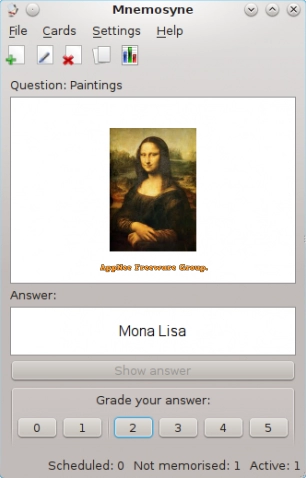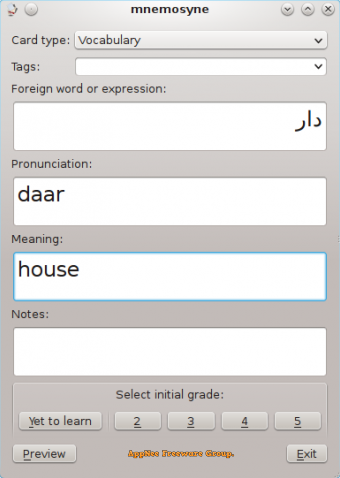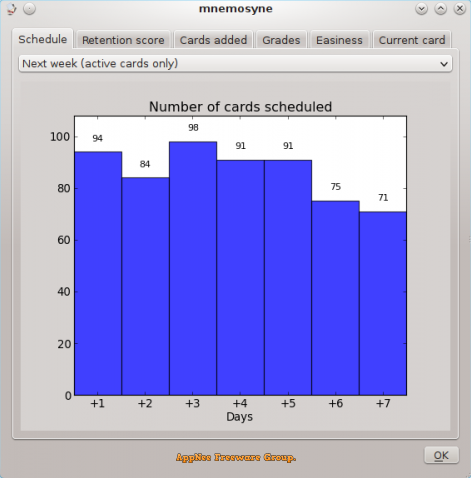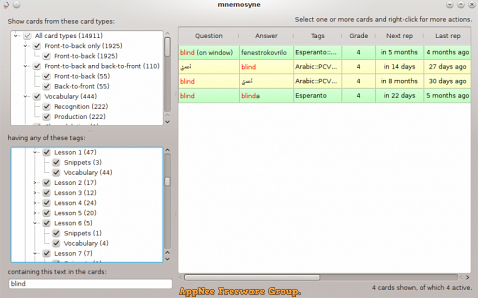| Ⅰ | This article along with all titles and tags are the original content of AppNee. All rights reserved. To repost or reproduce, you must add an explicit footnote along with the URL to this article! |
| Ⅱ | Any manual or automated whole-website collecting/crawling behaviors are strictly prohibited. |
| Ⅲ | Any resources shared on AppNee are limited to personal study and research only, any form of commercial behaviors are strictly prohibited. Otherwise, you may receive a variety of copyright complaints and have to deal with them by yourself. |
| Ⅳ | Before using (especially downloading) any resources shared by AppNee, please first go to read our F.A.Q. page more or less. Otherwise, please bear all the consequences by yourself. |
| This work is licensed under a Creative Commons Attribution-NonCommercial-ShareAlike 4.0 International License. |

Mnemosyne is a free, open-source and spaced-repetition (an evidence-based learning technique) flashcard program for Windows, Mac, Linux and mobile platforms, developed by Peter Bienstman from Belgium in 2003, written in Python. It can help you learn as efficiently as possible, i.e.: optimizes your learning process. Besides, it’s also a research project into the nature of long-term memory.
As a professional and user-friendly digital flashcard player, Mnemosyne is clear, uncluttered, easy to use and to understand for newbies, and infinitely customizable through plugins and scripts for power users. It works like a traditional flash-card program, but comes with an important twist: it uses a sophisticated algorithm to schedule the best time for a card to come up for review.
Although users of Mnemosyne usually make their own database of cards, the pre-made Mnemosyne databases are available, and it also allows to import SuperMemo collections and text files. It uses SQLite to store files. It’s also possible to import flashcard databases from Anki, as well as databases from older versions of Mnemosyne.
Mnemosyne can completely replace Flash Card Manager, studyPerfect, WinFlash, and has many similar tools, such like Anki, SuperMemo, Flashcard Exchange, Quizlet, StudyBlue, Cram, Memrise, Brainscape, Reji.



// Main Applications //
| Application | Description |
| Efficient learning | Mnemosyne uses a sophisticated algorithm to schedule the best time for a card to come up for review. Difficult cards that you tend to forget quickly will be scheduled more often, while Mnemosyne won’t waste your time on things you remember well. |
| Memory research | If you want, anonymous statistics on your learning process can be uploaded to a central server for analysis. This data will be valuable to study the behavior of our memory over a very long time period. The results will be used to improve the scheduling algorithms behind the software even further. |
// Key Features //
- Spacing algorithm based on an early version of the SuperMemo algorithm, SM-2, with some modifications that deal with early and late repetitions.
- Supports pictures, sound, video, HTML, Flash and LaTeX
- Portable (can be installed on a USB stick)
- Categorization of cards
- Learning progress statistics
- Stores learning data (represented as decks of cards that each have a question and an answer side) in “.mem” database files, which are interoperable with a number of other spaced repetition applications
- Plugins and JavaScript support
- Review cards on Android devices.
- Synchronization between other machines
// System Requirements //
- Python 3.5 or later
- PyQt 6.0 or later, including QtWebEngine.
- Matplotlib
- Easyinstall
- cheroot 5 or later
- Webob 1.4 or later
- Pillow
- gTTS for Google text-to-speech
- googletrans-new for Google translate support (Note: version 1.1.9 does not work, you need the latest version from Github.)
- argon2-cffi
- For Latex support: the latex and dvipng commands must be available (e.g., TeXLive on Linux, MacTeX on Mac, and MikTeX on Windows). On Arch based distributions, you’ll need texlive-core package too.
- For building the docs: sphinx (If you get sphinx-related errors, try installing sphinx as root)
- For running the tests: nose
// Related Links //
// Download URLs //
| License | Version | Download | Size |
| Freeware | Latest |  (mir1 | mir2) (mir1 | mir2) |
n/a |
(Homepage | GitHub | SourceForge)
| If some download link is missing, and you do need it, just please send an email (along with post link and missing link) to remind us to reupload the missing file for you. And, give us some time to respond. | |
| If there is a password for an archive, it should be "appnee.com". | |
| Most of the reserved downloads (including the 32-bit version) can be requested to reupload via email. |